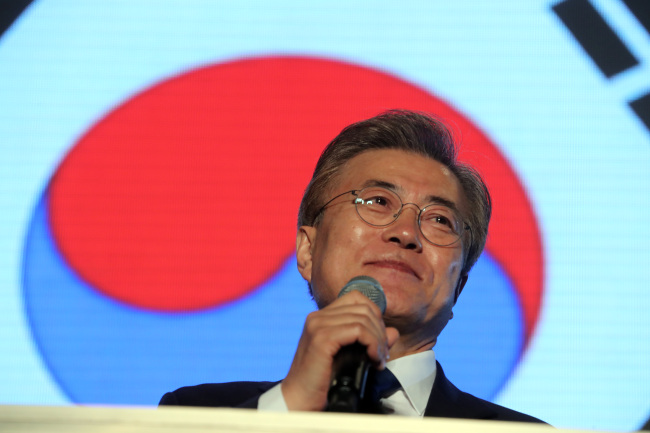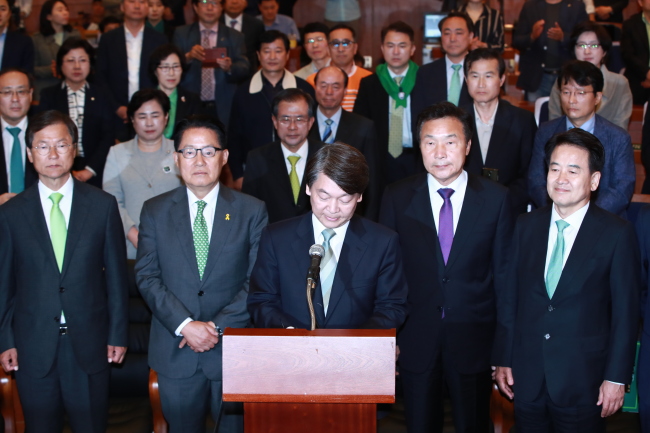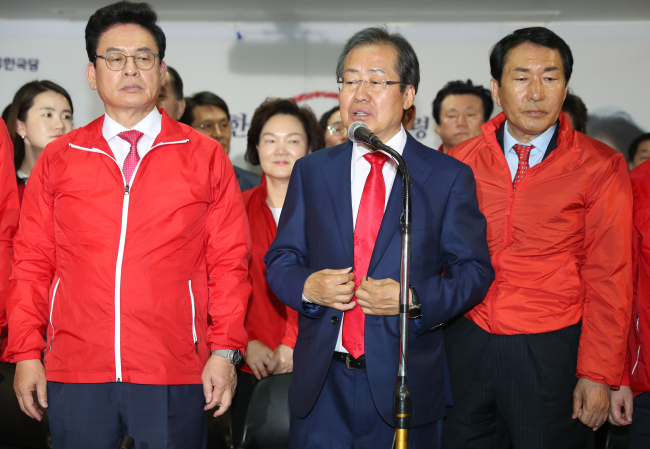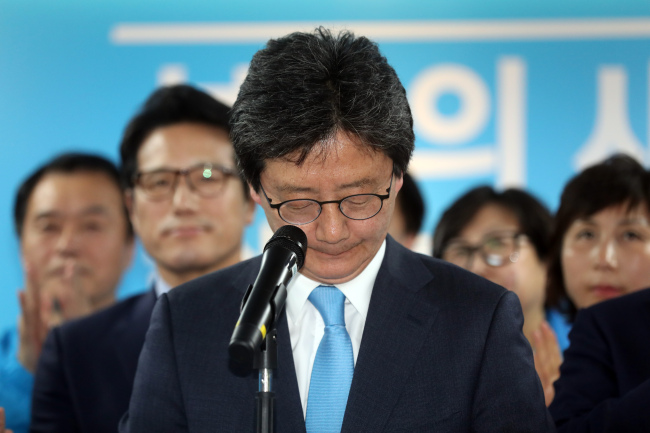Chapter of Korea’s political history closes with Moon Jae-in’s victory
Election to end months of turmoil, but divides likely to linger
By Korea HeraldPublished : May 10, 2017 - 00:16
After months of political upheaval, Moon Jae-in of the Democratic Party of Korea appears set to be the country’s next president.
The predicted win for Moon will mark the country veering to the left, after 10 years of conservative rule that ended with President Park Geun-hye being unseated by a peaceful civilian rebellion. Park’s ouster and a liberal’s rise to power also marks the end of a chapter in South Korea’s political history.
The predicted win for Moon will mark the country veering to the left, after 10 years of conservative rule that ended with President Park Geun-hye being unseated by a peaceful civilian rebellion. Park’s ouster and a liberal’s rise to power also marks the end of a chapter in South Korea’s political history.

Yet, the months of turmoil have also left the country deeply divided along political and generational lines, as evidenced in the 60-day, condensed campaigning for the snap presidential election.
The turmoil that brought South Korea to where it is now was set off by the scandal surrounding Park which broke in October last year.
It began with allegations that former presidential secretary Ahn Chong-beom was involved in raising funds for a cultural foundation. The allegation, relatively minor in Korea’s long history of presidents and their associates’ corruption, was a prelude to a scandal that would lead to the ouster of Park.
The allegation was soon followed by the revelation that Choi Soon-sil, a longtime associate of Park, was behind the foundation. Accusations quickly piled up against Choi, whom Park described as being like a maid to her, and subsequent investigations uncovered evidence that Park was involved in the alleged wrongdoings. Park denied all the allegations, but she was ultimately impeached and then arrested over a host of charges that include corruption.
The left rises
For the country’s progressive bloc, Park’s downfall and the chaos the conservatives fell into came as a golden opportunity.
Moon and his party pounced on the opportunity to highlight the shortcomings of the two consecutive conservative administrations, riding the winds of discontent stemming from Park’s alleged wrongdoings.
Although their strategy appears to have achieved its aim, the results are short of Moon’s hopes and reflects the division still evident in the country. In the final leg of his campaign, Moon had set a goal of receiving more than half of the votes, but early results suggest he will have fallen short.
The vacuum left by Park proved a boon for the six-seat Justice Party and its champion Rep. Sim Sang-jeung. In her third presidential bid, Sim broke away from the usual tactic of declaring for the mainstream liberal candidate and saw her campaign through to the end.
Sim also took every opportunity to press her agenda, and successfully took on her rivals in televised debates to garner unprecedented levels of public support.
However, not all non-conservatives have benefitted.
The rise of the left is likely to bode ill for Ahn Cheol-soo and his People’s Party.

In his campaign, Ahn attempted to stretch across the ideological divide and appeal to both liberals and conservatives, as well as centrists.
Although the ploy pushed up Ahn’s ratings for a time, it was at odds with many who came together to form the party. One example is the differences in Ahn and the party’s view on the deployment of the Terminal High Altitude Area Defense anti-missile system. For much of the campaign period, Ahn supported the weapons system being located in South Korea, while the majority view of his party was against it.
In addition, the party’s power base in the southwest, and its current Chairman Rep. Park Jie-won, among others, have long been associated with liberal icon the late former President Kim Dae-jung.
Conservative chaos
For the country’s right wing, Park’s downfall revealed a lack of strong leadership, and led to the Saenuri Party splitting into the Liberty Korea Party and more moderate Bareun Party.
Since the early 2000s, the conservatives were dominated by two main factions, whose leaders -- Park and Lee Myung-bak -- both went on to serve as presidents. With Park removed, the conservatives scattered, flocking from one possible champion to another.
First, conservatives hung their hopes on former UN Secretary-General Ban Ki-moon. When Ban called off his bid less than a month after setting up shop, the right looked toward acting President Hwang Kyo-ahn, who declined the call early on.
Ban and Hwang’s decisions threw conservatives into turmoil until the Liberty Korea Party, the larger of the two main conservative parties, picked Hong Joon-pyo as its candidate.
While the Liberty Korea Party chose to back the outspoken Hong, the Bareun Party’s choice was soft-spoken Rep. Yoo Seong-min.

The events of the past months have not all been bad for conservatives.
The birth of the Bareun Party -- the new hope of conservatives, in Yoo’s words -- marked the beginning of reform in the conservative bloc. Yoo’s drive for reform appears to have gained more momentum after more than a third of its lawmakers chose to leave the party. According to the party, daily donations increased 13-fold immediately following the desertion.
For established conservatives, the rapid growth of Hong’s popularity reaffirmed the presence of a solid support base. Although Hong began his campaign far behind his rivals, his support in polls increased rapidly, with some showing him on par with the People’s Party’s Ahn Cheol-soo.
Personality cult
Recent developments have also highlighted the imbalance between ideologies and policies, as well as the weight carried by individuals in Korean politics.
Park’s presidency was characterized by the words “betrayal” and “traitor,” and showed how some political heavyweights placed more importance on factions and leaders than policy direction.
The words were used not to describe those who acted against national interests, but to refer to conservative politicians who openly disagreed with Park.
Park was known to place particular importance on loyalty, and such tendencies were critical in her personnel management. One of the most prominent examples is former presidential chief of staff Kim Ki-choon. Kim’s connection to Park began in 1974 while her father President Park Chung-hee was still alive, and his loyalty to her has gone beyond the boundaries of a democratic republic’s politics. According to Rep. Lee Hye-hoon of the Bareun Party, Kim was in the habit of referring to Park as his “lord” in the sense of a monarch, and to her instructions as “commands.”
While her emphasis on loyalty may have served her personal needs, it was also instrumental in splitting the country’s normally united conservatives.

At the opposite end of Kim is Bareun Party’s Yoo, one of the most infamous “traitors.” His 2015 statement “welfare without tax increase is fiction,” regarding Park’s welfare funding ideas, gave rise to the term “politics of betrayal.” The tag has followed Yoo ever since, and is thought to have been a major factor in his low support, which hovered at around 5 percent throughout the campaign period.
By Choi He-suk (cheesuk@heraldcorp.com)
-
Articles by Korea Herald





![[From the Scene] Monks, Buddhists hail return of remains of Buddhas](http://res.heraldm.com/phpwas/restmb_idxmake.php?idx=644&simg=/content/image/2024/04/19/20240419050617_0.jpg&u=20240419175937)









![[From the Scene] Monks, Buddhists hail return of remains of Buddhas](http://res.heraldm.com/phpwas/restmb_idxmake.php?idx=652&simg=/content/image/2024/04/19/20240419050617_0.jpg&u=20240419175937)

![[KH Explains] Hyundai's full hybrid edge to pay off amid slow transition to pure EVs](http://res.heraldm.com/phpwas/restmb_idxmake.php?idx=652&simg=/content/image/2024/04/18/20240418050645_0.jpg&u=20240419100350)

![[Today’s K-pop] Illit drops debut single remix](http://res.heraldm.com/phpwas/restmb_idxmake.php?idx=642&simg=/content/image/2024/04/19/20240419050612_0.jpg&u=)